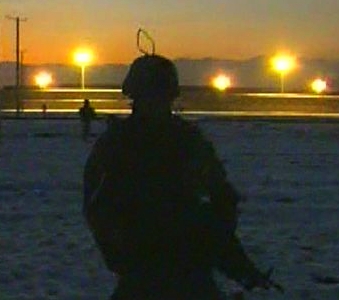
Publisher:
Bonnie King
CONTACT:
Newsroom@Salem-news.com
Advertising:
Adsales@Salem-news.com

~Truth~
~Justice~
~Peace~
TJP
Sep-26-2007 05:50

 TweetFollow @OregonNews
TweetFollow @OregonNews
DOD Says Mental Health Recommendations Will Help Military
Tim King Salem-News.comProblems in the overall system are unbeatable without money or commitment. The administration only began taking steps to improve problems after the huge, public fiasco at the Walter Reed Medical Center.
 Soldier on patrol in Afghanistan Photo by: Tim King |
(SALEM, Ore.) - New mental health recommendations from the Defense Department suggest a number of new programs that will help soldiers stay healthier. They are based on a report that was submitted by a DoD task force on June 12th.
In that report are 95 recommendations and what the government calls a "strong, positive vision that called for a cultural change to improve and enhance the psychological health and fitness of all our Active and Reserve component Service members as well as their families." The DoD says it is embracing the vision and the spirit embodied in the recommendations.
The DoD says they recognize that wars in Iraq and Afghanistan and repeated deployments into the combat theatre take a toll on the mental well-being of combat forces, and that they have raised questions about the adequacy of psychological health services and the DoD's delivery systems established during the Cold War era.
Calling the task force recommendations "A roadmap for change," the DoD says the Mental Health Task Force worked with other independent, external review groups as well as internal review procedures.
The department says that in order to achieve those ends, they are moving forward to create a culture, "that develops and supports a state of robust psychological health that is consistent across the Services."
They say this new culture puts into practice the adage “sound mind and sound body.” They say the practice can only be accomplished when psychological health and fitness is placed on an equal footing with physical health and fitness.
But obvious problems in the overall system are unbeatable without money or commitment. The current administration only began taking steps to improve the myriad problems after the huge, public fiasco at the Walter Reed Medical Center.
The DoD claimed prior to Walter Reed that the system was working well, now they say this: "Although we have put in place some early intervention practices, such as our deployment health assessment and education programs, most prevention and protection efforts have come at the expense of clinical care, calling on our clinicians to do double duty."
So much for running a country like a business, as Ross Perot suggested during an earlier campaign. In that environment people become only numbers, it seems that is still exactly what happened.
Another point to interject here, doesn't the military already keep people in good physical condition? So you make them run more miles? Achieve more pull-ups?
"Clearly, we have a responsibility to effectively identify and treat all psychological health conditions and ill-effects of war, and we are committed to accomplishing that task through a consistently excellent standard of care across the DoD."
What the Defense Department needs to do in order to preserve the mental health of servicemen and veterans is stop making official entries in their records if they seek help for mental distress and Post Traumatic Stress Disorder. That is exactly what the DoD does right now, and it blocks and prevents thousands upon thousands of veterans from admitting their illness and seeking help for it.
The official recommendations suggest things that this nation so far, can not provide for veterans. They say it is a responsibility that must be shared by our military leaders as well as individuals, community support organizations, and a "robust health care system" that is not in place in this country.
The Dod says their specific plan is to address each of the 95 recommendations.
"Our plan of action began immediately upon receipt of the report using multiple summits, planning and implementation teams, as well as important ongoing senior leader oversight of the plan of action. In addition, we formed a strong partnership with our Federal partners in the Department of Veterans Affairs and the Department of Health and Human Services to build a safety net of care and a transparent picture of service to our military families."
The Dod says that in a parallel effort, they are applying the "generous funding levels provided by Congress specifically for psychological health and traumatic brain injury to begin the process of change."
Post Traumatic Stress Disorder funding according to DoD records for 2007 is $151.0 Million, the funding for Traumatic Brain Injury in 2007 is $150.0 Million. Perhaps that qualifies as "generous" by some standards, but it seems a pittance in comparison to the traumatic head injuries suffered by our military soldiers and the lifelong affects of PTSD.
The DoD says they will implement all 95 of the recommendations, and they say they will move quickly when and where they can. "When additional clarification or more data are needed, we will devote time and resources to clarify or study the extent of the problem," they said.
"In developing our plan, we worked aggressively to analyze the recommendations and cut through any potential organizational obstacles to rapidly accelerate the planning and implantation cycle to get the solutions in place as quickly as possible."
Quick to reassign the fault, the DoD says the problems are nothing new. "The problems did not emerge overnight and for sustained improvements to be institutionalized, an iterative, data-informed process is clearly warranted. We will continue to review, implement, and revise our plan as we move forward to ensure the best possible solutions are identified and implemented in the most appropriate time frame."
The people implementing the changes say they hope to have the major elements in place by May of 2008. It sounds ambitious, and surely will not be fast enough to help every fighting soldier who is injured, but at least the DoD is pledging to make improvements, and they can't happen too quickly.
Some other main points of recommendations:
- Creating a governance structure through a system of Directors of Psychological Health and dedicated mental health management teams that will place the highest priority on the full continuum of psychological health.
- Placing psychological health leaders as advisors to commanders as well as at senior Department and Service leadership levels.
- Build psychological fitness and resilience, while dispelling stigma building resilient forces and families while reducing stigma are objectives closely tied with first objective related to leadership and culture.
- Embed operational psychological health professionals into line units to be trusted advisors to line leaders and trusted supporters of military Service members.
- One of the most effective tools in decreasing stigma is education. Develop and provide training that is targeted to leaders, families, service members, medical staff and community support staff.
- "Work with the military departments to develop and execute an anti-stigma campaign, using some of the best and brightest minds in the military, federal family, and civilian professional community to ensure the right tools are created and used to reduce stigma associated with seeking mental health care when needed and at the earliest possible time."
If you want more details, check out the Mental Health task Force's report that was submitted to Congress: MHTF-Report-to-Congress
------------------------------------------------------------

Tim King is a former U.S. Marine with almost twenty years of experience on the west coast as a television news producer, photojournalist and reporter. Today, in addition to his role as a war correspondent in Afghanistan where he spent the winter of 2006/07, this Los Angeles native serves as Salem-News.com's Executive News Editor. Salem-News.com is the nation's only truly independent high traffic news Website, affiliated only with Google News. You can send Tim an email at this address: newsroom@salem-news.com
Articles for September 25, 2007 | Articles for September 26, 2007 | Articles for September 27, 2007

googlec507860f6901db00.html
Salem-News.com:



Terms of Service | Privacy Policy
All comments and messages are approved by people and self promotional links or unacceptable comments are denied.
[Return to Top]
©2025 Salem-News.com. All opinions expressed in this article are those of the author and do not necessarily reflect those of Salem-News.com.